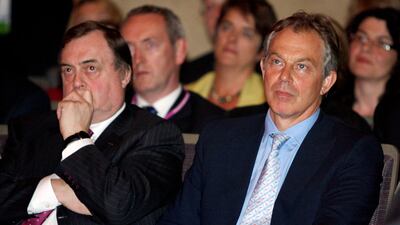Former UK deputy prime minister John Prescott, who served as Tony Blair’s number two during the Iraq war, has died aged 86 following a battle with Alzheimer's, his family has announced.
The former trade union activist and ex-merchant seaman died “peacefully” and surrounded by relatives at his care home, they said.
Lord Prescott’s family said he had “spent his life trying to improve the lives of others, fighting for social justice and protecting the environment”.
He was a key figure of New Labour, and a loyal supporter of Mr Blair in office but subsequently critical of parts of the project's legacy, denouncing Britain's involvement in the Iraq War.
Writing for The Sunday Mirror in 2016, Lord Prescott said he would “live with the decision of going to war and its catastrophic consequences for the rest of my life”.
“In 2004, the UN secretary general Kofi Annan said that as regime change was the prime aim of the Iraq War, it was illegal. With great sadness and anger, I now believe him to be right.”

Lord Prescott ceased to be a member of the UK Parliament's upper house in July this year because of health issues. He had only spoken once in the chamber since suffering a stroke in 2019, official records show, and had not voted since February 2023.
Former prime minister and Labour leader Mr Blair said he was “devastated” by the death of Lord Prescott, describing his deputy as “one of the most talented people I ever encountered in politics”.
“I relied on him many times: when in difficulty, under attack and, less well known, when I needed someone whose gut instinct I trusted better than my own,” he said. “He was one of the most talented people I ever encountered in politics; one of the most committed and loyal; and definitely the most unusual,” added Mr Blair.
“He will deservedly occupy a special place in the pantheon of the Labour leadership; he will be mourned by his many friends and fans around the world and for me personally, today is a day of profound sadness but also immense pride in having known him and worked with him: a great man and great servant of country and party.”
Gordon Brown, former Labour leader and Mr Blair's successor as prime minister, said Lord Prescott realised you could not succeed in government unless you came to clear decisions. “And that’s what he kept pushing for,” he told Radio 4's Today show on Thursday.
“Iraq was an incredibly difficult issue for people and I think it still remains a very difficult issue. Mistakes were obviously made, but John was determined the government would hold together. So despite his image as a tough person who was perhaps uncompromising, John was actually the first to want people to work together,” added Mr Brown.
Prime Minister Keir Starmer said Lord Prescott was a “true giant of the Labour movement” and one of the “key architects” of the last Labour government.
Lord Prescott, seen by many as custodian of the party's traditional values in the face of a modernising leadership, served for 10 years as deputy prime minister after Labour's 1997 general election landslide.
At times short-tempered, he famously punched a protester who threw an egg at him during an election campaign visit to North Wales in 2001.

But during much of his time in office, he acted as a mediator in the often turbulent relationship between Mr Blair and chancellor Gordon Brown.
In a private letter in 2007, Mr Blair said his former deputy's role “smoothing out problems, sorting out colleagues and troubleshooting” had been an “integral part of getting things done”.
The former prime minister said: “The completely unique Prescott blend of charm and brutality – made always more effective by the unpredictability of which would be predominant – got you through the decade, kept the government together and above all, gave me a lot of fun. I was lucky to have you as my deputy.”
He also oversaw the environment, transport and the regions, a brief which included helping to negotiate the international Kyoto Protocol on climate change.
Former US vice president Al Gore, who worked with Lord Prescott on the Kyoto Protocol in 1997, said he had “never worked with anyone in politics – on my side of the pond or his – quite like John Prescott”.

“He possessed an inherent ability to connect with people about the issues that mattered to them – a talent that others spend years studying and cultivating, but that was second nature to him,” said Mr Gore in a statement.
“He fought like hell to negotiate the Kyoto Protocol and was an unwavering champion of climate action for decades to come. I'm forever grateful to John for that commitment to solving the climate crisis and will miss him as a dear friend.”
Born in Prestatyn in Wales on May 31, 1938, the son of a railwayman, Lord Prescott left school at the age of 15 to work as a trainee chef and then as a steward on the Cunard Line. He joined the Labour Party as a teenager and became an active member of the National Union of Seaman.
Lord Prescott was first elected as MP for Hull East in 1970 and went on to hold the seat for almost 40 years. He received a peerage in 2010.
In a statement released after his death, his wife Pauline and sons Johnathan and David said that representing the people of Hull had been “his greatest honour”.
“John dearly loved his home of Hull and representing its people in Parliament for 40 years was his greatest honour. We would like to thank the amazing NHS doctors and nurses who cared for him after his stroke in 2019 and the dedicated staff at the care home where he passed away after latterly living with Alzheimer's.”


